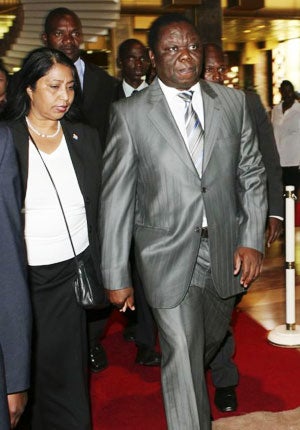Power talks close to collapse as Mugabe refuses to back down

Power-sharing talks in Zimbabwe appeared close to final collapse last night as the two sides remained "miles apart" on details of a unity government. After nine months without a legal government, the shattered country now faces further political uncertainty to add to a cholera epidemic, famine and economic meltdown.
Sources close to the talks said President Robert Mugabe was refusing to give way to any opposition demands for unity government, leaving the process "almost certain to fail."
The Movement for Democratic Change (MDC) was refusing to be bulldozed into a deal that would amount to "political suicide", the source said.
The MDC leader Morgan Tsvangirai returned to Zimbabwe after more than two months to make a final push to break the deadlock with the ruling Zanu-PF party, but the only thing the two sides appear to agree on is that these talks will be decisive.
The negotiations in Harare contrast with the optimistic outlook when the parties agreed to a surprise deal in September last year. The then South African president, Thabo Mbeki, claimed vindication at the time for his years of "quiet diplomacy". He was back as mediator yesterday – with his successor, Kgalema Motlanthe, and Mozambique's President, Armando Guebuza – despite the MDC rejecting him.
Mr Tsvangirai, whose first-round win in the presidential vote in March last year sparked the crisis, has refused to join the government unless he is given control of powerful ministries such as home affairs, finance and information.
He has demanded the release of MDC members and human rights activists abducted in what he said was a "slap in the face" to the power-sharing talks.
Authorities who previously denied ordering the abductions have charged more than a dozen activists with taking part in a plot to overthrow the government. Many of those abducted have given sworn statements that they were tortured while in custody.
Ever since Mr Mugabe signed up to Mr Mbeki's unity deal, he has sought to reinforce his authority by relegating the MDC to junior partners. The former school teacher signalled last month he would go it alone if the opposition refused to do as they were told and sign.
The political commentator John Makumbe said: "Since they signed the deal, the parties are further apart and there is a strong likelihood of the total collapse of the political agreement.
"It is very likely that Zanu-PF will go it alone and form a minority government. It is also very likely that without an agreement, the humanitarian crisis will take a sharp turn for the worse."
More than 2,300 people have died of cholera in recent months and the UN estimates that as many as five million Zimbabweans face starvation. Malnutrition has already contributed to a surge in Aids deaths and compounded the casualties from cholera.
Political deadlock has prevented international donors from putting together a rescue package. The World Food Programme says there are shortfalls in January's feeding programme.
Despite calls for a tougher stance on Mr Mugabe, the regional bloc, the Southern African Development Community, has instead pressured Mr Tsvangirai to accept joint control of key ministries. The Parliament is due to meet today to decide on the next step.
Any attempt by Zanu-PF to force through a minority government would face parliamentary and legal challenges.
Join our commenting forum
Join thought-provoking conversations, follow other Independent readers and see their replies
Comments
Bookmark popover
Removed from bookmarks